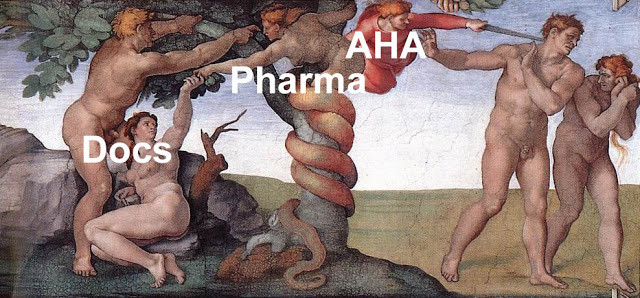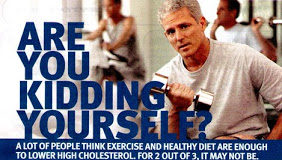“It is a breathtaking sweep to squash something that is really important to us, the science going on in the private sector,” said Francis Collins, director of the National Institutes of Health, at a meeting in Bethesda, Md. At issue is a decision by the American Heart Association (AHA) to ban pharmaceutical industry employees from making medical education presentations later this year at the AHA’s annual scientific sessions (see “Drug firms banished from medical talks“).
“The policy is blood-curdling,” said Keith Yamamoto, executive vice dean of the University of California, San Francisco School of Medicine. “This is conflict-of-interest considerations run amok.”
Wow! It’s as if physicians were banished from an Eden where they enjoyed the fruits of the tree of knowledge made accessible by the pharmaceutical industry. To some, it’s a development of biblical proportions that deserves an appropriate image:
Before the drug industry advocates get their panties in a bundle over this, let’s see exactly what the AHA says about the policy (find it here):
“In compliance with ACCME requirements, employees of a commercial interest entity cannot be the presenting author of the abstract. A commercial interest is defined as any entity producing, marketing, re-selling, or distributing healthcare goods or services consumed by, or used on, patients. For our purposes, an employee is defined as someone who is directly working for the commercial interest as their primary employer and the commercial interest provides their primary source of income. A person acting as a contractor to a commercial interest, providing consultation, or other services secondary to their primary appointment at, for example, a university, would not be considered an employee.”
“If the abstract is selected for presentation (oral or poster),” says AHA, “the employee of the commercial interest cannot present but must select another author.”
What this means is that an abstract that is authored soley by a physician or physicians DIRECTLY employed full-time by a pharmaceutical company can be blocked. Otherwise, another, non-pharma employee author can make the presentation. There is almost always other non-pharma authors, including the physicians who ran the clinical studies being reported. Also, ghostwriters can make presentations, as indicated by this FAQ from AHA:
Q: I am the primary author of an abstract and designated as the presenter. I am currently employed by a home health agency. Can I still present my abstract?
A. Yes, the ACCME does not consider providers of clinical service directly to patients to be commercial interests.
IMHO, all the fuss over this AHA decision is unjustified as far as physician education is concerned. It may, however, be a blow to pharma research physicians who do all their clinical trials in-house without using independent physicians outside the firm. And that kind of “science” we can do without.









![6 Digital Tools at the Center of Healthcare Digitalization [INFOGRAPHIC]](http://ec2-54-175-84-28.compute-1.amazonaws.com/pharma-mkting.com/wp-content/uploads/2021/04/6DigitalTools_600px-100x70.jpg)




